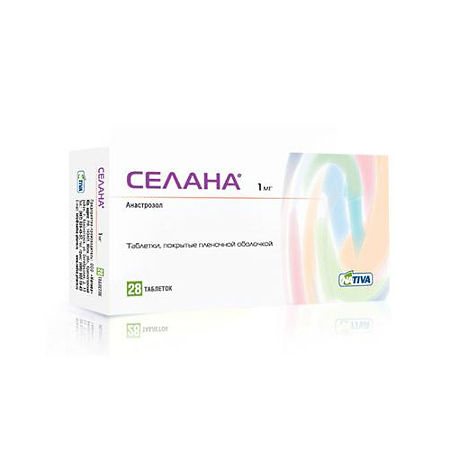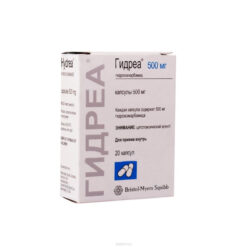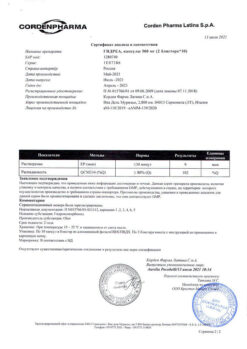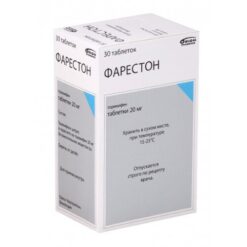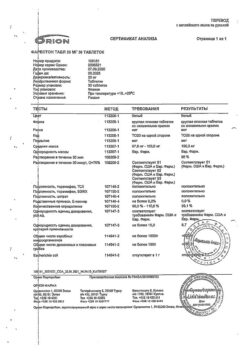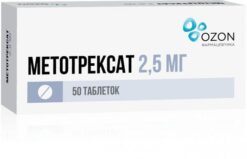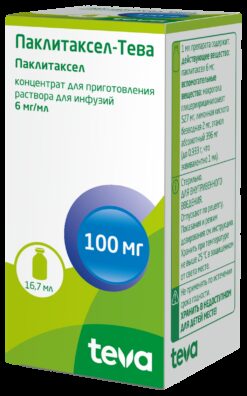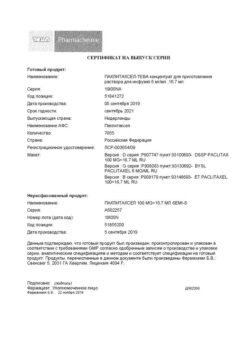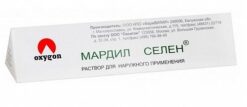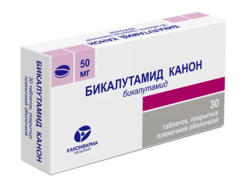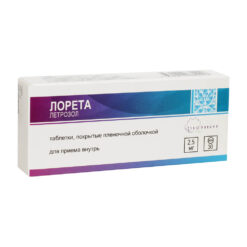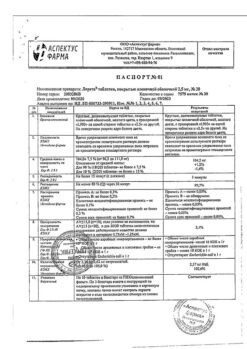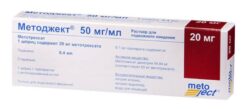No products in the cart.
Description
Pharmacodynamics
Anastrozole is a highly selective nonsteroidal aromatase inhibitor. Aromatase is an enzyme by which, in postmenopausal women, androstenedione is converted in peripheral tissues to estrone and then to estradiol. Anastrozole has antitumor activity against estrogen-dependent breast tumors in postmenopausal women. In postmenopausal period the drug in daily dose of 1 mg causes decrease of concentration of estradiol by 80%.
Anastrozole has no progestogenic, androgenic or estrogenic activity.
Anastrozole at a daily dose of up to 10 mg has no effect on cortisol and aldosterone secretion (therefore, no corticosteroid replacement is required when using the drug).
Pharmacokinetics
Intake
After oral administration, anastrozole is rapidly absorbed from the gastrointestinal tract. Maximum concentration (Cmax) in plasma is reached within 2 hours (fasting). Food slightly reduces the rate of absorption, but not its degree and does not lead to a clinically significant effect on the equilibrium plasma concentration of the drug in a single daily dose.
Distribution
Anastrozole binds to plasma proteins by 40%. Approximately 90% to 95% of the equilibrium plasma concentration of anastrozole is reached after 7 days of administration. No pharmacokinetic parameters are known to be time and dose dependent.
Metabolism
Anastrozole is metabolized by N-dealkylation, hydroxylation and glucuronidation. Triazole, the main metabolite determined in plasma, does not inhibit aromatase.
Anastrozole is slowly excreted with a half-life (T1/2) of 40 to 50 hours.
Anastrozole and its metabolites are excreted mainly in the urine. Less than 10% of the dose is excreted unchanged in the urine within 72 hours after drug administration. Pharmacokinetics in Special Clinical Cases
The determined clearance of anastrozole after oral administration in patients with cirrhosis or impaired renal function does not differ from that determined in healthy subjects.
The pharmacokinetics of anastrozole are independent of age in postmenopausal women.
Indications
Indications
Active ingredient
Active ingredient
Composition
Composition
1 tablet contains:
acting substance:
anastrozole 1 mg
auxiliary substances:
Magnesium aluminosilicate, 9 mg;
croscarmellose sodium, 3 mg;
colloidal silica – 3 mg;
Magnesium stearate – 0.5 mg;
Ludipress (in terms of components: lactose monohydrate – 77.7 mg; povidone – 2.9 mg; crosspovidone – 2.9 mg) – 83.5 mg
film sheath:
Opadry II white 85F48105 (polyvinyl alcohol – 35 to 49%, talc – 9.8 to 25%; macrogol 3350 – 7.35 to 35.2%,
titanium dioxide – 15.15 to 30%) – 5 mg
How to take, the dosage
How to take, the dosage
To the mouth, swallow it whole and drink water.
It is recommended that the drug be taken at the same time of day.
In adults, including elderly patients, the drug is prescribed 1 mg once daily, long term.
The drug should be stopped if there are signs of disease progression. As adjuvant therapy, the recommended duration of treatment is 5 years.
Patients with mild to moderate renal insufficiency do not require dose adjustment.
Patients with mild hepatic impairment do not require dose adjustment.
Interaction
Interaction
Anastrozole reduces the effectiveness of estrogens.
Clinical studies have shown that concomitant use of anastrozole with antipyrine and cimetidine is unlikely to cause drug interaction due to induction of microsomal liver enzymes.
Special Instructions
Special Instructions
In case of uncertainty about a patient’s hormonal status, the menopausal state should be confirmed by additional biochemical studies.
The safety of anastrozole in patients with moderate liver dysfunction has not been established.
Anastrozole should not be used concomitantly with estrogens.
Impact on ability to drive and operate machinery
Do not perform work requiring high concentration and quick psychomotor reactions during treatment.
Contraindications
Contraindications
With caution
Osteoporosis, hypercholesterolemia, lactose deficiency, lactose intolerance, glucose-galactose malabsorption (the drug formulation contains lactose), coronary heart disease, liver function disorders.
Side effects
Side effects
Endocrine system: “hot flashes”, vaginal dryness and thinning of hair.
Digestive system disorders: anorexia, nausea, vomiting, diarrhea. In patients with advanced breast cancer, in most cases with metastases to the liver, elevated GGT levels and less often – alkaline phosphodiesterase were noted.
CNS disorders: asthenia, somnolence, headache.
Metabolism: a slight increase in total cholesterol.
Allergic reactions: skin rash.
Additional information
| Weight | 0.020 kg |
|---|---|
| Shelf life | 3 years. |
| Conditions of storage | In a dry, light-protected place at a temperature not exceeding 25 °C. |
| Manufacturer | Nativa, Russia |
| Medication form | pills |
| Brand | Nativa |
Related products
Buy Celana, 1 mg 28 pcs. with delivery to USA, UK, Europe and over 120 other countries.

